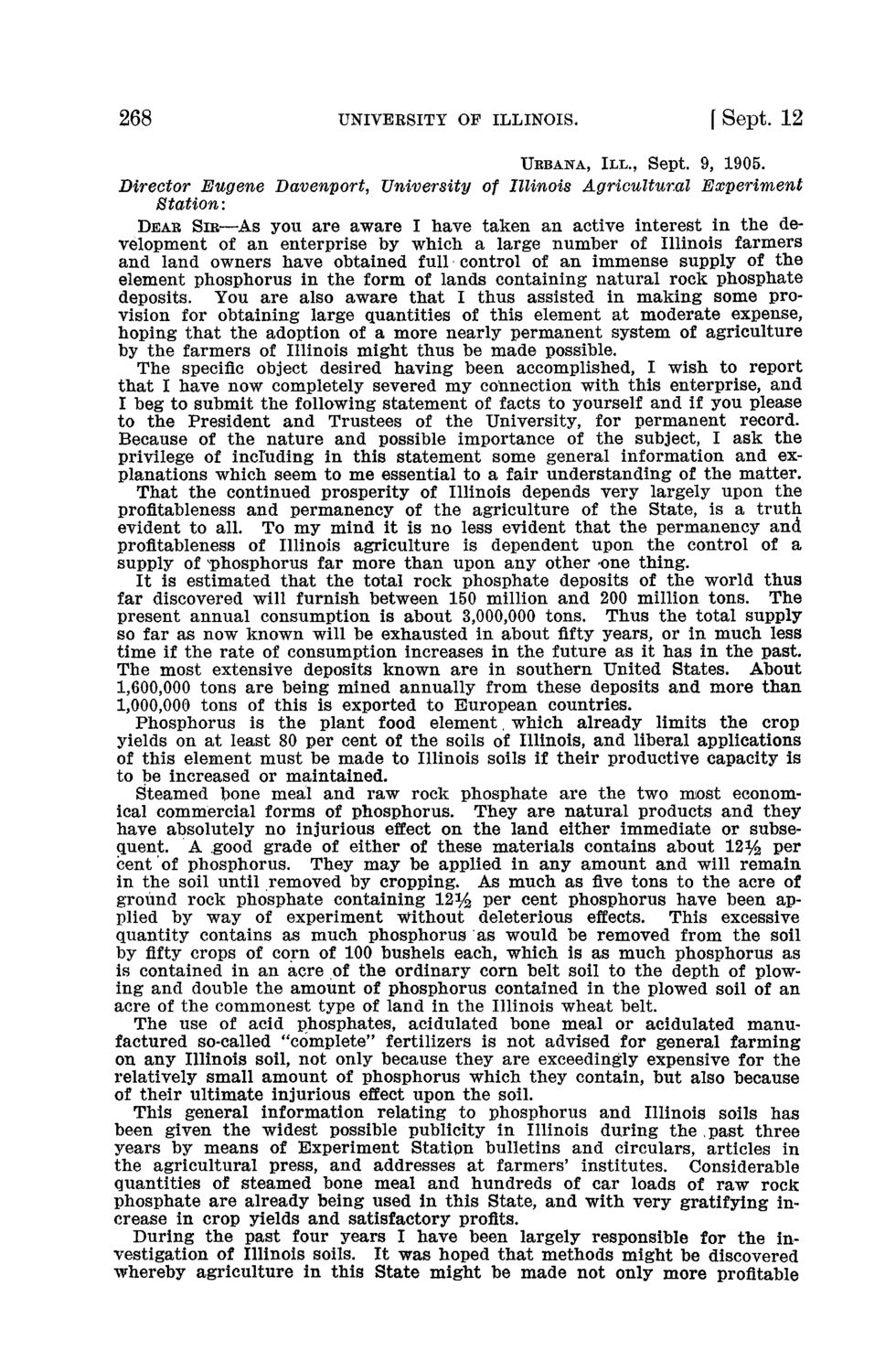| |
| |
Caption: Board of Trustees Minutes - 1906
This is a reduced-resolution page image for fast online browsing.

EXTRACTED TEXT FROM PAGE:
268 UNIVEESITY OF ILLINOIS. f Sept. 12 1905. UEBANA, I I I . , Sept. 9, Director Eugene Davenport, University of Illinois Agricultural Experiment Station: DEAB SIR—As you are aware I have taken an active interest in the development of an enterprise by which a large number of Illinois farmers and land owners have obtained full control of an immense supply of the element phosphorus in the form of lands containing natural rock phosphate deposits. You are also aware that I thus assisted in making some provision for obtaining large quantities of this element at moderate expense, hoping that the adoption of a more nearly permanent system of agriculture by the farmers of Illinois might thus be made possible. The specific object desired having been accomplished, I wish to report that I have now completely severed my connection with this enterprise, and I beg to submit the following statement of facts to yourself and if you please to the President and Trustees of the University, for permanent record. Because of the nature and possible importance of the subject, I ask the privilege of including in this statement some general information and explanations which seem to me essential to a fair understanding of the matter. That the continued prosperity of Illinois depends very largely upon the profitableness and permanency of the agriculture of the State, is a truth evident to all. To my mind it is no less evident that the permanency and profitableness of Illinois agriculture is dependent upon the control of a supply of phosphorus far more than upon any other one thing. It is estimated that the total rock phosphate deposits of the world thus far discovered will furnish between 150 million and 200 million tons. The present annual consumption is about 3,000,000 tons. Thus the total supply so far as now known will be exhausted in about fifty years, or in much less time if the rate of consumption increases in the future as it has in the past. The most extensive deposits known are in southern United States. About 1,600,000 tons are being mined annually from these deposits and more than 1,000,000 tons of this is exported to European countries. Phosphorus is the plant food element, which already limits the crop yields on at least 80 per cent of the soils of Illinois, and liberal applications of this element must be made to Illinois soils if their productive capacity is to be increased or maintained. Steamed bone meal and raw rock phosphate are the two most economical commercial forms of phosphorus. They are natural products and they have absolutely no injurious effect on the land either immediate or subsequent. A good grade of either of these materials contains about 12% per cent of phosphorus. They may be applied in any amount and will remain in the soil until removed by cropping. As much as five tons to the acre of ground rock phosphate containing 12% per cent phosphorus have been applied by way of experiment without deleterious effects. This excessive quantity contains as much phosphorus as would be removed from the soil by fifty crops of corn of 100 bushels each, which is as much phosphorus as is contained in an acre of the ordinary corn belt soil to the depth of plowing and double the amount of phosphorus contained in the plowed soil of an acre of the commonest type of land in the Illinois wheat belt. The use of acid phosphates, acidulated bone meal or acidulated manufactured so-called "complete" fertilizers is not advised for general farming on any Illinois soil, not only because they are exceedingly expensive for the relatively small amount of phosphorus which they contain, but also because of their ultimate injurious effect upon the soil. This general information relating to phosphorus and Illinois soils has been given the widest possible publicity in Illinois during the past three years by means of Experiment Station bulletins and circulars, articles in the agricultural press, and addresses at farmers' institutes. Considerable quantities of steamed bone meal and hundreds of car loads of raw rock phosphate are already being used in this State, and with very gratifying increase in crop yields and satisfactory profits. During the past four years I have been largely responsible for the investigation of Illinois soils. It was hoped that methods might be discovered whereby agriculture in this State might be made not only more profitable
| |